Intro
Master 5 bipolar disorder tips to manage symptoms, reduce mood swings, and improve mental health with effective coping strategies and stress management techniques.
Living with bipolar disorder can be challenging, but there are ways to manage the condition and improve the quality of life. Bipolar disorder is a mental health condition that affects mood, energy, and activity levels, causing extreme mood swings that can range from manic highs to depressive lows. It is essential to understand the condition, its symptoms, and the available treatment options to develop effective coping strategies. In this article, we will discuss five bipolar disorder tips that can help individuals manage their condition and achieve a better balance in life.
Bipolar disorder is a complex condition that requires a comprehensive treatment approach, including medication, therapy, and lifestyle changes. While there is no cure for bipolar disorder, the right treatment and self-management strategies can help individuals manage their symptoms, reduce the frequency and severity of episodes, and improve their overall well-being. By understanding the condition and its effects on daily life, individuals can take the first step towards recovery and develop a more positive outlook on life.
Managing bipolar disorder requires a long-term commitment to treatment and self-care. It involves working closely with a healthcare provider to develop a personalized treatment plan, attending therapy sessions, and making lifestyle changes to promote overall health and well-being. With the right approach, individuals can learn to manage their symptoms, reduce the risk of episodes, and improve their relationships with family and friends. In the following sections, we will discuss five bipolar disorder tips that can help individuals achieve a better balance in life and improve their overall quality of life.
Bipolar Disorder Management
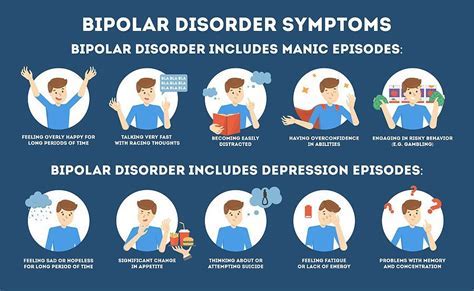
Benefits of Medication
Medication is a crucial component of bipolar disorder treatment, and it can help individuals manage their symptoms and reduce the frequency and severity of episodes. There are several types of medication available, including mood stabilizers, antipsychotics, and antidepressants, each with its own benefits and risks. By working closely with a healthcare provider, individuals can find the right medication and dosage to manage their condition and improve their overall quality of life.Bipolar Disorder Treatment

Types of Therapy
Cognitive-behavioral therapy is a type of therapy that focuses on changing negative thought patterns and behaviors that contribute to bipolar disorder symptoms. Interpersonal therapy, on the other hand, focuses on improving relationships with others and developing more effective communication skills. Family therapy can provide individuals and their loved ones with the support and guidance they need to manage the condition and improve their overall well-being.Bipolar Disorder Lifestyle Changes
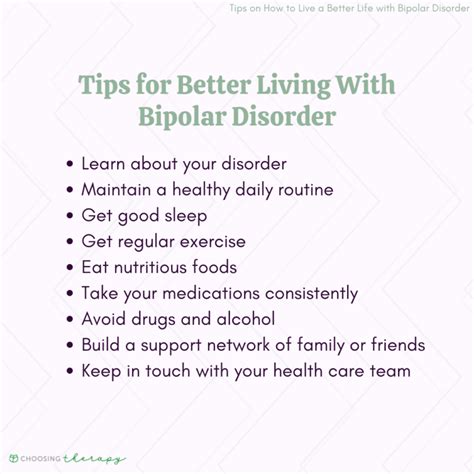
Importance of Self-Care
Self-care is essential for managing bipolar disorder and improving overall quality of life. It involves taking care of physical, emotional, and mental health, and engaging in activities that promote relaxation and stress reduction. Individuals can benefit from practicing yoga, meditation, or deep breathing exercises, as well as engaging in hobbies and activities that bring them joy and fulfillment.Bipolar Disorder Support
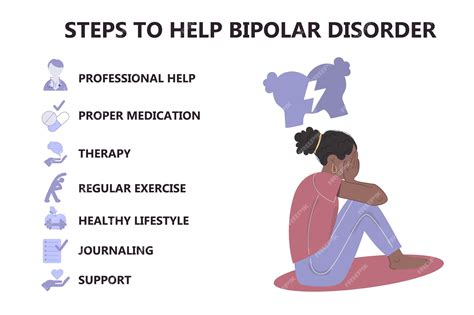
Benefits of Support Groups
Support groups can provide individuals with a safe and supportive environment where they can share their experiences, connect with others, and learn new coping strategies. They can also provide individuals with access to resources, information, and guidance, which can help them manage their condition and improve their overall quality of life.Bipolar Disorder Education
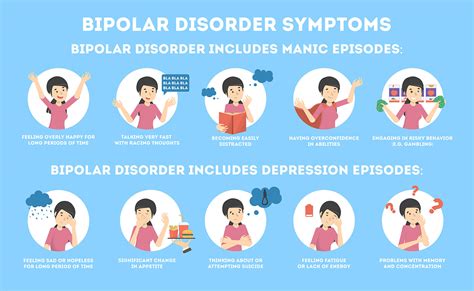
Importance of Awareness
Awareness is essential for managing bipolar disorder and improving overall quality of life. Individuals can benefit from learning about their condition, its symptoms, and the available treatment options. They can also benefit from learning about lifestyle changes, stress management techniques, and coping strategies that can help them manage their condition and improve their overall well-being.Bipolar Disorder Resources
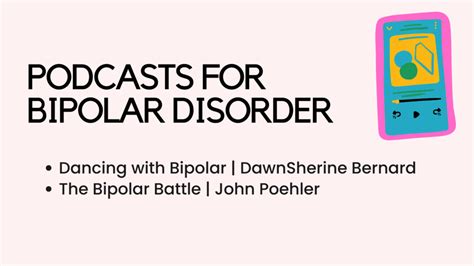
Benefits of Online Resources
Online resources can provide individuals with access to a wealth of information, guidance, and support, which can help them manage their condition and improve their overall quality of life. They can also provide individuals with access to online support groups, where they can connect with others who are going through similar experiences.What are the symptoms of bipolar disorder?
+The symptoms of bipolar disorder can vary depending on the individual and the type of episode they are experiencing. Common symptoms include mood swings, changes in energy and activity levels, and changes in sleep patterns.
How is bipolar disorder treated?
+Bipolar disorder is typically treated with a combination of medication and therapy. Medication can help stabilize mood, reduce symptoms, and prevent episodes, while therapy can provide individuals with the tools and strategies they need to manage their condition and improve their relationships with others.
Can bipolar disorder be managed?
+Yes, bipolar disorder can be managed with the right treatment and self-management strategies. Individuals can benefit from working closely with a healthcare provider, attending therapy sessions, and making lifestyle changes to promote overall health and well-being.
In conclusion, managing bipolar disorder requires a comprehensive approach that includes medication, therapy, and lifestyle changes. By understanding the condition, its symptoms, and the available treatment options, individuals can develop effective coping strategies and improve their overall quality of life. We encourage readers to share their experiences, ask questions, and seek support from others who are going through similar challenges. By working together, we can promote awareness, education, and support for individuals living with bipolar disorder, and help them achieve a better balance in life.
